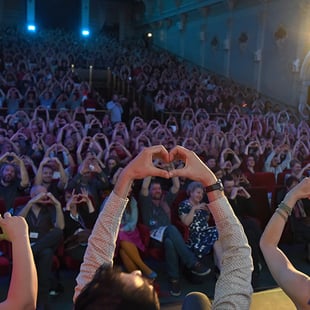Back
As officially and glamorously as if it were on Oscar ceremony, on Monday, 6 June, the 26th World Festival of Animated Film – Animafest Zagreb opened. Until 11 June, to Zagreb’s Europa and Tuškanac cinemas and the Zagreb Dance Centre it will bring a heap of outstanding events, with over 300 film titles.
Comparisons with the American Academy Awards can be made for two reasons: one, Oscar-winning films are one of this year’s themes (and the festival mascot The Substitute is the protagonist of the only Croatian film ever to have won the Academy Award), and two, right at the opening ceremony three awards were presented and four made public.
The Lifetime Achievement Award, at the discretion of the Animafest Council, went to the Belgian master of animation Raoul Servais, and the Award for Outstanding Contribution to Animation Studies went to the Polish director and producer Marcin Giżycki. The International Animated Film Association (ASIFA) gave the Award for Outstanding Contribution to the Art of Animation to Giannalberto Bendazzi, and the best animation school is the the University of Arts and Design Moholy-Nagy of Budapest.
Aside from the winners, the stage hosted many festival guests and their hosts: ASIFA members Corrie Francis parks, Thomas Renoldner, Nancy Phelps and Vesna Dovniković, Festival Council president Margit Antauer, Animafest’s artistic director Daniel Šuljić, festival producers Paola Orlić and Matea Milić, managing director of the Croatian Audiovisual Centre Hrvoje Hribar, and deputy head of the City Office for Education, Culture and Sport Tedi Lušetić, who opened the festival together with Margit Antauer, saying that there are a lot of festivals in town, but only one Animafest.
“It is lovely to be back again to this beautiful country I used to visit every year as a young man,” said Raoul Servais, remembering his first visit to the Zagreb festival in 1972, when his film Operation X-70 won a Grand Prix. Audience honoured Servais with a long and impressive applause.
Council president Margit Antauer also remembered this period and read an excerpt from Servais’s interview in Vjesnik when he first visited the festival. Among other things, he said back then that animation is his reason to live, that he couldn’t live without it and that he believes in it, since he as a child decided he would work in animation.
The winner of the Award for Outstanding Contribution to Animation Studies Marcin Giżycki said that when he first visited Zagreb, 36 years ago and met Bendazzi and Servais, he couldn’t even imagine that one day he would be receiving an award together with them. Deeply moved and surprised by the award was Bendazzi, who is presenting at the festival his ‘life project’, a recently published book Animation: A World History, an almost 1500-page volume of the history of global animation. He is also having a lecture on the relation between the Oscars and the Zagreb School of Animation.
In his introductory speech, managing director of the Croatian Audiovisual Centre Hrvoje Hribar said that “in the world of animation anything is possible and here in Croatia we are quite at home with animation.”
“We have won Golden Lions with Mimica, Oscars with Vukotić, as well as awards at many other festivals, and we still do,” said Hribar and thanked all those who make the festival and prove that animation is indeed “a magnificent triumph of human labour.”
The film programme opened with The Erlking by the festival guest Georges Schwizgebel, Very Lonely Cock by Leonid Shmelkov, Winter Love by Isabel Herguera, Planemo by Veljko Popovićm Blind Vaysha by Theodor Ushev, All Rot by Max Hattler, The Uncanny Valley by Paul Wenninger and Lili Brushes Her Teeth by Siri Melchior. A rerun is scheduled for Wednesday, 8 June at 1pm, Europa cinema.
On Tuesday, audience can enjoy in a rich festival programme at all cinemas, including a retrospective of films by Raoul Servais, who is having a Q&A after the screening. The international symposium Animafest Scanner III begins as well, followed by the opening of the exhibition of works by students from the Academy of Media Arts Cologne – KHM at ULUPUH Gallery and the experimental interactive installation PIEdeck at Zagreb Dance Centre / Oktogon.



